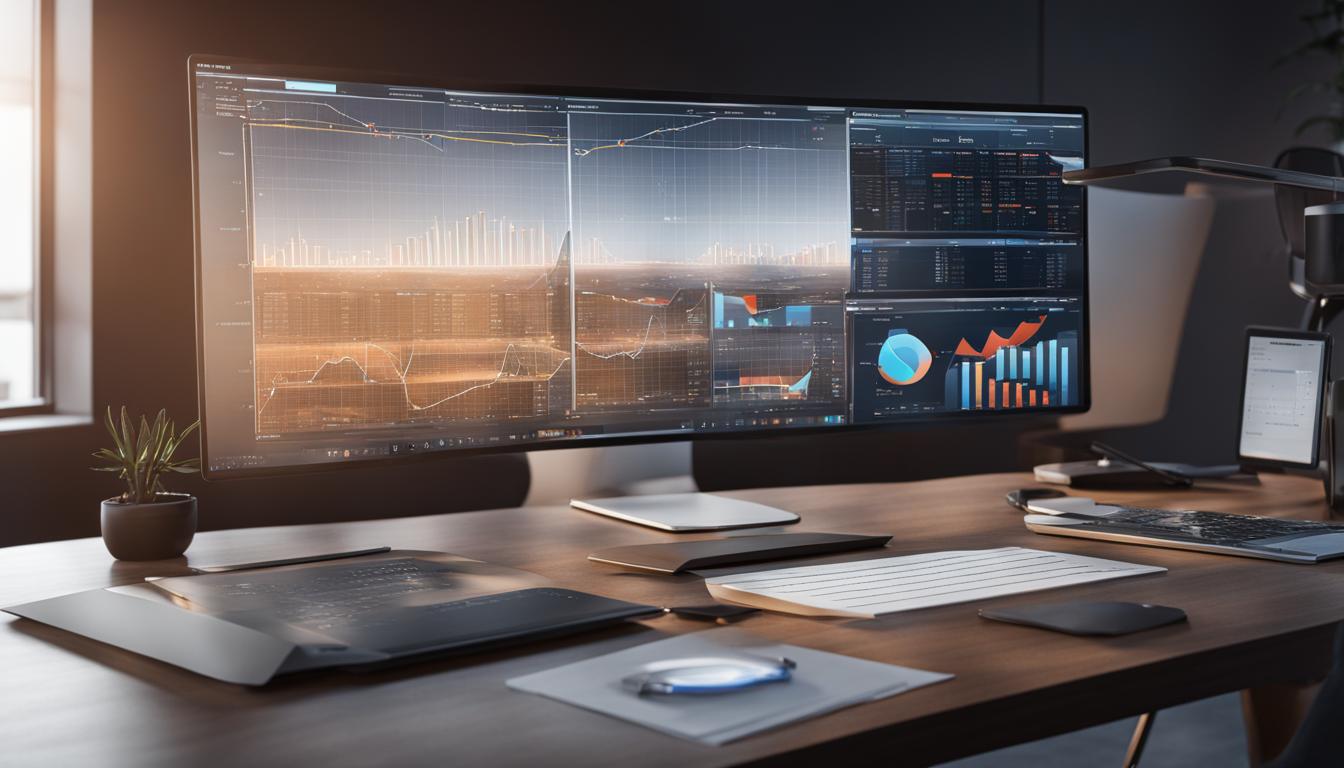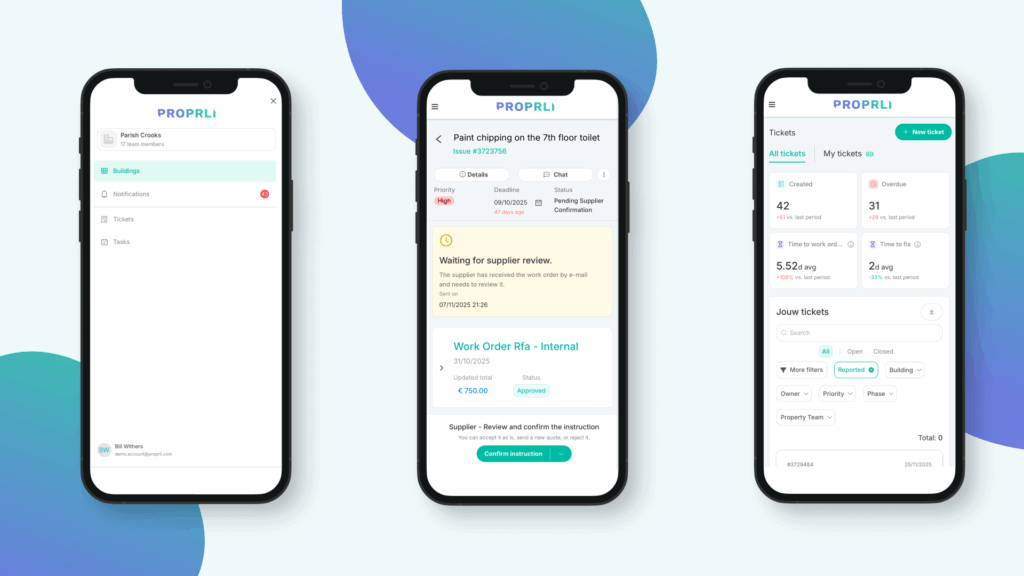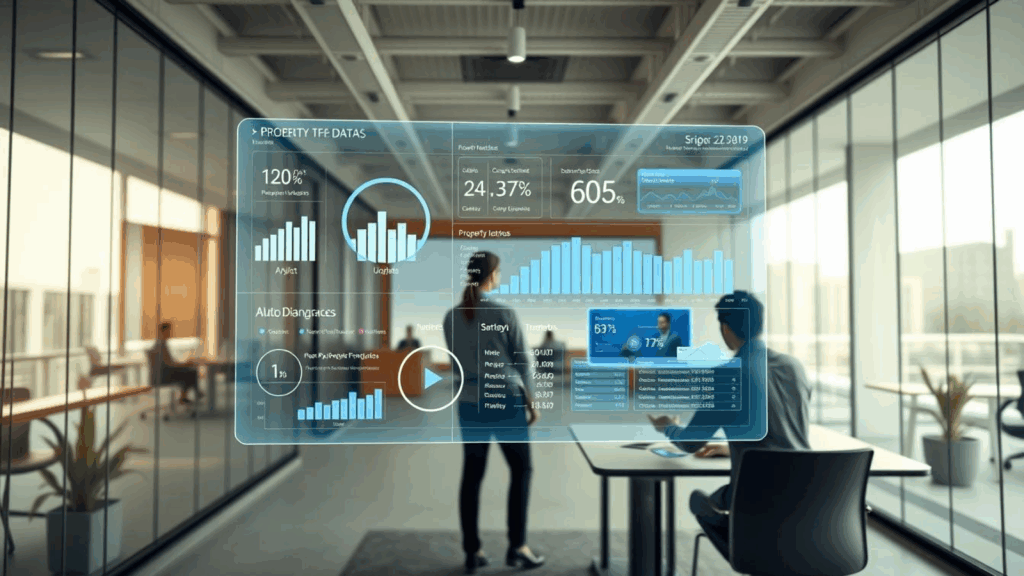Property and real estate managers face an array of challenges when managing residential and commercial properties. Fortunately, there is a wide selection of property management software and real estate management tools designed to streamline these processes and promote efficient property management. These tools range from cloud-based platforms to locally installed applications, catering to the distinct needs of different property types and their associated functions. When choosing the best property management software, it is crucial to consider its core focus, compatibility with existing technology infrastructure, and its ability to automate tasks to drive business growth. This article provides an overview of the essential software tools in property management systems, the role of cloud-based solutions in modern real estate management, and the importance of user-friendly interface and robust security features in property management tools.
Key Takeaways:
- Choosing the right property management software based on its core features and focus.
- Utilizing cloud-based solutions for real-time management and collaboration.
- Improving efficiency through automated maintenance management and communication tools.
- Evaluating the user interface and ease of access to ensure seamless adoption and use.
- Optimizing tenant engagement through online portals and real-time notifications.
- Implementing integrated security measures to protect sensitive data and ensure compliance.
- Scalability of property management software to support growing business needs.
Understanding the Core Features of Property Management Software
Property management software offers a multitude of features tailored to streamline the diverse tasks associated with managing residential and commercial properties. To make the most out of these software solutions, one must comprehend their core functionalities, primarily revolving around tenant and lease tracking, finance management, and operational reporting and analytics.
Key Modules for Tenant and Lease Tracking
A robust property management system holds tenant management and lease tracking modules as the backbone of its functionality. These essential tools streamline the entire management process through:
- Automating lease administration
- Monitoring occupancy status
- Tracking rent payments and renewals
A software equipped with comprehensive tenant tracking systems allows managers to efficiently handle various property portfolios and maintain smooth tenant relations. These systems efficiently store and access tenant information while ensuring legal compliance and complete documentation.
Finance and Accounting Integration
Finance management software embedded into property management solutions proves indispensable in handling property-related expenses and income. These accounting modules allow for:
- Real estate accounting
- Expense tracking
- Property financial reporting
Seamless accounting integration with existing systems is crucial to maintain continuity with legacy financial data and processes. Property managers and investors benefit from comprehensive financial reports that provide insights into the fiscal health of their portfolios.
Operational Reporting and Analytics
Property management analytics and operational reporting tools play a pivotal role in informed decision-making and strategic planning. These modules help in the following ways:
- Comparing expenses and income
- Assessing property profitability
- Monitoring key performance indicators (KPIs)
Accessible and visually engaging reports allow managers to track their property’s performance over selected timeframes, making it easier to understand trends and optimize the management process.
Cloud-Based Solutions for Real-Time Management
Cloud-based property management software is revolutionizing the way businesses in the real estate industry operate. By offering real-time access to essential management tools, property managers can make quicker decisions and streamline operations. This shift to cloud platforms eliminates the need for a physical office location, allowing for seamless collaboration between property managers, vendors, and tenants. In addition to providing access to real-time property management tools, cloud-based software also offers numerous benefits for both property managers and tenants. The following are some key advantages of adopting these cloud solutions for real estate management:
- Remote access: Property managers can access crucial information and tools from any location with an internet connection, making it easier to manage properties on-the-go.
- Improved communication: Cloud platforms facilitate effortless communication between property managers, vendors, and tenants through online portals and messaging systems.
- Easy scalability: Cloud-based solutions enable easy expansion or reduction of software features, allowing businesses to adapt to changing property management needs.
- Increased data security: Cloud-based systems often feature robust data encryption and security measures to protect valuable information from cyber threats.
One of the most significant benefits of cloud-based property management software for tenants is the convenience of online payment processing and communication. With a cloud-based platform in place, tenants can quickly submit maintenance requests, make rent payments, and keep open lines of communication with property managers. In conclusion, the adoption of cloud-based property management software offers multiple advantages to businesses in the real estate sector. Through real-time access to essential management tools, property managers can ensure efficient operations, while tenants can enjoy convenience and transparent communication.
Improving Efficiency with Automated Maintenance Management
In the realm of property management, automated maintenance management plays a critical role in achieving operational excellence. By leveraging advanced software solutions for maintenance scheduling and repair tracking, property managers can optimize their workflow and enhance tenant satisfaction levels.
Scheduling and Tracking Repairs
Maintenance scheduling software and repair tracking applications empower property managers to stay on top of repairs and maintenance work for their properties while ensuring timely and accurate resolutions for tenant requests. Some of the most prominent advantages of these tools include:
- Automated assignment of tasks to maintenance vendors
- Real-time status updates on repairs and maintenance work
- Seamless integration with property management platforms
- Tracking of maintenance costs and budget allocation
- Automatic notifications for tenants and property owners
Maintenance vendor management becomes much more manageable with software that connects property managers, maintenance teams, and vendors under one unified system. The result is improved collaboration, reduced miscommunications, and increased efficiency in managing maintenance tasks.
Streamlining Vendor Communications
Vendors are integral to the property management process, and effective communication is crucial for executing maintenance tasks smoothly. Integrating vendor communications software with property management platforms helps reduce potential misunderstandings, resulting in better service provision to tenants. Key features of these communication tools include:
- Centralizing vendor contracts and performance evaluations
- Streamlining invoice processing and payment tracking
- Organizing vendor contact information and availability
- Facilitating easy communication with vendors through messaging platforms
In summary, property management communication tools serve as catalysts in fostering harmonious relations with vendors and enhancing overall service quality. By incorporating automated maintenance management software into their daily operations, property managers can significantly boost efficiency and deliver a superior living experience to tenants.
Evaluating User Interface and Ease of Access
When it comes to choosing the right property management software, the user interface and ease of access are critical factors to consider. A tool that is uncomplicated and user-friendly for both management professionals and tenants will expedite adoption rates and minimize training requirements. An efficient interface is crucial for tenants, as it directly impacts their ability to submit maintenance requests, manage rent payments, and communicate with property managers. Selecting a software that offers intuitive property management tools allows for a seamless experience for all users involved. In addition to a user-friendly interface, software ease of access is essential for a property management system. A platform that can be accessed from any device, particularly smartphones or tablets, empowers users to handle tasks on-the-go, improving overall efficiency and convenience. When evaluating user interface property management software, it’s important to consider the following aspects:
- Responsive design for an optimal viewing experience on all devices
- Clear, easy-to-understand navigation menus and buttons
- Functional communication and notification tools for quick correspondence
- Customizable features tailored to each user’s specific needs
Ultimately, the goal is to strike a balance between offering robust functionality and user-friendliness. By doing so, property managers can ensure the software is easily adopted and utilized to its full potential, elevating the overall efficiency of property management operations.
Optimizing Tenant Engagement with Online Portals
In today’s digitally-driven world, optimizing tenant engagement is crucial for property management companies. One of the most effective ways to achieve this is by offering user-friendly online portals equipped with tenant self-service features. These renter online portals provide tenants with the independence to manage their affairs, while at the same time streamlining tasks for property managers.
Self-Service Options for Renters
High-quality tenant engagement tools facilitate self-service options for renters, allowing them to take charge of their property-related needs. A well-designed online portal enables tenants to do the following:
- Submit maintenance requests and track repair statuses
- Pay rent online, view payment history, and set up automatic payments
- Communicate with property managers directly
- View and download important documents and forms
- Update personal information and preferences
By providing these features, property management companies can enhance the overall living experience of tenants, ultimately fostering tenant satisfaction and loyalty.
Real-Time Notifications and Updates
Another valuable aspect of tenant engagement tools is the ability to send real-time notifications for tenants. Providing instant updates via online communication portals helps to keep tenants in the loop and ensures effective communication between tenants and property managers. Some key notifications that can be sent through tenant update tools include:
| Notification Type | Description |
|---|---|
| Maintenance schedules | Tenants can receive updates about scheduled maintenance, repair appointments, and expected completion times for their requests. |
| Payment confirmations | Tenants can receive instant confirmations for rent payments, late fees, and other charges, ensuring clear records and preventing misunderstandings. |
| Lease renewals and terminations | Automatic reminders for upcoming lease renewals or terminations can help tenants stay prepared and avoid potential penalties. |
| Policy updates | Notify tenants of any changes to property rules, regulations, or terms to ensure compliance and uphold community standards. |
By incorporating real-time notifications and updates into their tenant engagement strategy, property management companies can foster a sense of involvement and trust among their tenants, ensuring they remain informed and engaged with the property management processes.
The Role of Property Management Systems in Financial Reporting
Property management systems play an integral role in financial reporting by providing comprehensive tools that aid in creating detailed financial statements and reports. These systems help track financial performance, forecast budgeting for maintenance and operations, and ensure financial transparency for property owners and investors. In this section, we outline the importance of property management financial reporting and discuss the benefits of using accounting software for property managers and financial reporting tools. Among the various tasks property managers handle, monitoring and tracking finances is crucial to successfully managing properties. With the help of financial reporting tools, property managers can better understand the financial health of their properties and make informed decisions on property management and maintenance activities.
- Track income and expenses
- Generate profit and loss statements
- Create balance sheets
- Maintain records of tenant-ledger transactions
- Perform bank reconciliation
- Monitor budget on maintenance and operations
- Forecast future financial performance
One of the most significant financial reporting tools available to property managers is accounting software. By selecting the right accounting software, property managers can simplify bookkeeping processes, ensure accurate record-keeping, and facilitate financial transactions between owners, tenants, and vendors.
Some examples of accounting software for Property Managers are:
- Yardi
- QuickBooks
- AFAS
- MRI
- Xero
- Aareon | REMS
- Unit4
- Twinfield
- Exact
- FreshBooks
- Zoho Books
By integrating financial reporting tools and accounting software into their property management system, property managers can improve efficiency, reduce the chances of errors, and streamline financial workflows. Additionally, providing property owners and investors with timely, accurate, and comprehensive financial reports can help build trust and foster long-term professional relationships.
Selecting Software with Robust Security and Data Protection
In the digital age, data breaches and cyber security threats are quickly becoming a major concern for property managers. As a result, it is imperative that property management software prioritizes security features and data protection measures. While evaluating software security property management solutions, there are several key factors to consider:
- Encryption: The chosen software should utilize robust encryption technology to protect sensitive data, such as tenant and owner information, financial records, and other confidential details.
- Security audits: Regular security audits help ensure that the software is up-to-date with the latest security practices and is effectively safeguarding user data. Look for providers who frequently assess their security measures to maintain high standards.
- Privacy policies: A clear and comprehensive privacy policy should outline how the software handles and protects private information. This documentation must be easy to access and straightforward for both property managers and tenants to understand.
Diligently researching data protection real estate software options and weighing these critical factors will help property managers choose a secure property management system that effectively safeguards sensitive information from unauthorized access and misuse.
Scalability: Choosing Software That Grows with Your Business
As property management businesses grow, their software must be able to scale accordingly. Scalable property management software offers flexible feature sets that can be customized to suit expanding portfolios, ensuring that the software adapts to the evolving needs of the business without the constant need for switching or upgrading systems. Implementing scalable solutions is crucial for businesses in the real estate sector because it directly impacts the efficiency and effectiveness of property management operations. The benefits of investing in scalable property management software include:
- Improved adaptability to meet changing market conditions and challenges.
- Seamless integration of new properties and tenants into the system.
- Avoidance of the need for constant software upgrades or replacements.
- Increased potential for revenue growth through optimized workflows.
Ensuring Flexible Feature Sets for Expanding Portfolios
Property management software should offer flexibility in accommodating various property types, management methods, and tenant preferences. By choosing software that can easily adapt to the dynamic real estate environment, property management businesses can remain agile and competitive in an ever-evolving market. Here are some essential considerations when selecting software with flexible feature sets for expanding portfolios:
- Robust customization options: The best property management software allows for extensive customization to cover the nuances of various property types and client preferences, ensuring that it can adapt to changing requirements as the business grows.
- Integration capabilities: Scalable software should integrate seamlessly with other systems and tools commonly used by property management professionals, such as accounting, reporting, and maintenance management solutions. This allows for easier data transfer and workflow optimization.
- Cost-efficiency: Scalable software solutions should offer pricing options that reflect the size and growth of the business. This ensures that property managers are getting the most value for their investment and can maintain profitability as their portfolios expand.
In conclusion, a scalable property management software is essential for businesses aiming for long-term growth and success in the real estate industry. By investing in a solution that can adapt to the company’s needs both now and in the future, property managers can ensure that their software remains an asset rather than a hindrance to their expanding operations.
The Advantages of Integrated Communication Tools
As property management becomes more complex and interconnected, the need for integrated communication tools within property management software has become increasingly critical. By maintaining streamlined communication channels throughout the various departments involved in property management, these systems improve collaboration and efficiency, ensuring property managers can consistently provide high-quality service to both clients and tenants.
- Collaborative Work Environment: The integration of real estate management collaboration tools within the property management software facilitates a productive work environment by enabling all team members to easily access and share information. This collaborative approach fosters a sense of unity and improves overall results.
- Consistent Information Access: Integrated communication property management systems guarantee that each employee has the most up-to-date data on each property, tenant, and owner, which eliminates the risk of miscommunication or misinformation.
- Improved Vendor Relations: Thanks to the property management communication features, the software simplifies communication channels with maintenance vendors, allowing for easy management of service requests and tracking of repairs, ensuring timely and efficient resolution of issues.
- Enhanced Tenant Experience: By providing real-time information on maintenance, payments, and other relevant issues, integrated communication tools contribute to a better tenant experience and improved tenant satisfaction.
When selecting property management software, it is crucial to consider the benefits of integrating communication tools. By enhancing efficiency, fostering collaboration, and offering excellent service to clients and tenants, integrated systems significantly contribute to the success of property management businesses.
How a Comprehensive CRM Elevates Client Relationships
In today’s competitive real estate market, maintaining strong client relationships is crucial for the success of any agency. A comprehensive Customer Relationship Management (CRM) system is essential for managing client relationships effectively in real estate. Specialized CRM for real estate is specifically tailored to meet the unique needs of property managers, offering a range of tools that facilitate lead management and prospect tracking.
Lead Management and Prospect Tracking
A successful real estate CRM system must have robust lead management software capabilities. These features ensure that property managers can capture and nurture leads more effectively. Some essential tools for lead management in real estate CRM platforms include:
- Contact management: A centralized database to store and organize client information, making it easily accessible for the entire team.
- Lead capture: Tools to automatically collect and import leads from various sources, such as websites, social media, and third-party platforms.
- Automated follow-ups: Schedule and automate follow-up messages to ensure timely communication with leads, increasing their chances of converting into clients.
Besides lead management, a CRM system with a prospect tracking tool can be a game-changer for property managers. This feature allows for in-depth tracking of prospects’ behavior, preferences, and interactions, which can inform marketing and sales strategies. Additionally, it can help agents prioritize leads and categorize them based on their likelihood to convert. The benefits of employing a CRM system that offers effective lead management and prospect tracking include:
- Higher lead conversion rates: With the right tools, property managers can improve lead nurturing and boost the chances of converting leads into clients.
- Enhanced efficiency: Automation features help reduce manual tasks and streamline workflows, optimizing the overall efficiency of the sales process.
- Better client relationships: A comprehensive CRM system aids in long-term client retention by enabling property managers to maintain effective communication and provide better service to their clients.
Investing in a comprehensive CRM for real estate, equipped with reliable lead management and prospect tracking tools, can help property managers manage their client relationships more effectively. This, in turn, results in better customer engagement, higher lead conversion rates, and ultimately, increased revenue for the business.
Keeping Up With Owner and Tenant Expectations Digitally
In today’s digitally-driven world, property management services need to adapt to the growing expectations of landlords and renters, who increasingly prefer conducting business online. Some critical online services that cater to these evolving digital owner tenant expectations include payment processing, maintenance and repair handling, leasing management, document management, and financial reporting. By incorporating property management digital tools and online property management services, property managers can cater to the shifting preferences of clients and renters, offering convenience and real-time access to services. Below is a summary of various digital services that address the owner and tenant expectations in the property management industry:
| Digital Service | Description |
|---|---|
| Payment Processing | Enable landlords and renters to facilitate online transactions for rent payments, security deposits, and other fees in a secure and convenient manner. |
| Maintenance and Repair Handling | Allow tenants to submit maintenance requests online and track the repair status while providing real-time updates to property managers and landlords. |
| Leasing Management | Digitally manage lease agreements, applications, and renewals while simplifying the overall leasing process for property managers, owners, and tenants. |
| Document Management | Securely store and manage property-related documents, contracts, and records in a centralized online repository accessible to authorized users. |
| Financial Reporting | Generate, analyze, and share financial reports online, improving efficiency, accuracy, and transparency in financial management. |
Property management software featuring online portals and digital solutions can cater to these aspirations and empower property management firms to offer modern services that stand out from the competition. As the digital era progresses, property managers who proactively invest in these tools and services ensure a seamless transition into the realm of online property management services for both owners and tenants.
Conclusion
In today’s ever-evolving real estate landscape, harnessing the power of advanced property management software solutions is paramount in enhancing operations and staying ahead of the competition. Property managers must carefully assess and implement industry-leading software tools to address the diverse needs of their clients and tenants. By leveraging top property management software with a comprehensive array of features, such as tenant and lease tracking, financial integration, and scalable solutions, property managers can successfully navigate the complexities of the industry and ensure long-term success. Adopting software that caters to both operational efficiency and adapting to the digital demands of owners and tenants, allows real estate professionals to streamline workflows and drive overall business growth. Ultimately, a well-implemented property management system will empower property managers and professionals to excel in their field, fostering productive relationships with clients and tenants alike while making a lasting impact in the real estate industry. The future of property management relies on technology that not only meets the needs of today, but is adaptable and scalable for the challenges and opportunities that lie ahead.






